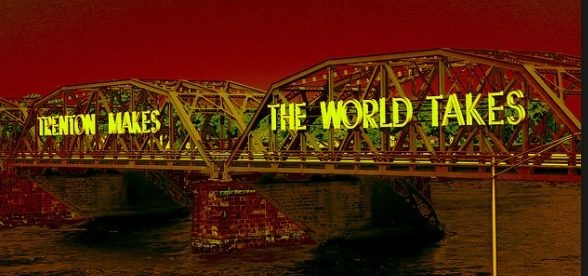Trenton Voices Speak for Trenton as the NJ Marijuana Capital

“West 8th Street is the birth canal of New Jersey medical marijuana,” says Leo Bridgewater, co-founder of NJ Cannabis Commission, Sub-Committee Chair of Minorities with the NJ Cannabusiness Association, and former Iraqi War veteran. He is also a local Trenton resident who serves as an activist for the therapeutic benefits of marijuana. “People are completely oblivious to [this].”
If the issue of medical, and recreational, marijuana will remain a hot-button issue in New Jersey, then Trenton will be the geographic focus of this ongoing debate. As New Jersey stalls in its plans to legalize medical marijuana (the next vote will be sometime in May), its legalized medical marijuana program is a booming enterprise. Since medical marijuana’s legalization in 2010, New Jersey has witnessed the creation of the New Jersey Medical Marijuana Program, which expanded affordable access to the drug for patients covered by Medicare and Medicaid. Since then, access to medical marijuana has only grown as cutbacks in bureaucratic red tape, decreased membership payments, and the expansion of the qualifying medical conditions has swelled the membership numbers (the Department of Health expects 50,000 members to be enrolled within the upcoming months). There are currently six operating medical marijuana dispensaries in New Jersey: Bellmawr, Cranberry Township, Egg Harbor, Montclair, Secaucus, and Woodbridge. Six more are planned to be opened within the upcoming year.
However, despite its epithet as “New Jersey’s medical marijuana capital,” Trenton seems to be not playing an active role in New Jersey’s medical marijuana boom. For example, Trenton still does not have an operating medical marijuana dispensary that can cater to patients within New Jersey’s southern region. Tracy Syphax, the founder of Phax Construction and Design Group, recently tried to acquire a license to open a medical marijuana dispensary in Trenton, Trenton Metro LLC, but was unsuccessful. “I don’t why I didn’t get a license,” says Syphax. “I can’t speak for the state.” He remains a little critical at the state’s decisions, though, stating that “Rahway [who received a license to operate in central Jersey] is not central Jersey.” He also states that “it takes one hour and ten minutes to go to Cranberry [the closest dispensary from Trenton] and get back right now using mass transportation.” Trenton, on the other hand, would be “prime location” because of its proximity to transit lines and highways.
“Syphax is not a time appropriate candidate” says Bridgewater. “You need pedigree in identity.” Bridgewater’s comments are, to some degree, accurate. The most recent application process for six new licenses was given to mostly out-of-state franchises (the first application process, on the other hand, favored NJ-owned businesses). Thus, Syphax’s bid was not “time appropriate” because of his relative lack of prominence in the national medical marijuana industry.
Another Trenton resident, NJ Weedman, a restaurateur who made state-wide news for his arrest and incarceration for illegally identifying a police informant, has also been received skeptically as a reputable candidate for Trenton’s marijuana movement. Whereas Syphax did not have a suitable pedigree, NJ Weedman “does not have any pedigree.”
Aside from a lack of suitable leaders, there is also a lack of community initiative. According to Bridgewater, “there is a lack of young people,” given that less than 9,000 people voted in the last mayoral and city council elections. “This is an indictment to anyone who considers themselves a leader or a politician.” He has also been critical of the African American community in their lack of participation. He told me about a visit he made to the Emmanuel Baptist Church in Brooklyn, New York to engage with community members. “The black church is the gatekeeper to the African American community. They have been absent from the conversation.” Since our conversation in late March, several New Jersey reverends have voiced their criticism for legalization of marijuana.
The other problem is local government. “They [city council] are Flintstones writing rules for a Jettson’s subject,” says Bridgewater. His main concern is the generational language that councilmen, as well as representative at the state legislature, have used to describe marijuana. The use of the term “gateway drug” implies that marijuana’s hallucinogenic properties are illicit and dangerous qualities. Instead, Bridgewater supports the use of the term “exit drug” for medical marijuana’s therapeutic affects. As an Iraqi veteran, Bridgewater’s use of marijuana products provided relief for his post-traumatic-stress disorder symptoms. “It’s an outdated term [“gateway drug”]. It’s like their [city council] in Season 1, Episode 6. They need to catch up.” Syphax, on the other hand, stated that he received complete support from the mayor and city council. City Council President Katy McBride did not respond for a comment.
Despite these protestations, these Trenton voices remain hopeful that New Jersey’s capital city will live up to its new epithet. Bridgewater retains trust in Mayor Reed Gusciora, who, as he consistently reminded me, is the author of the industrial hemp use bill in New Jersey. “Land is cheap,” said Mayor Gusciora at a Cannagather NJ event in Trenton in October 2018. The Trenton 250 Economic Development Report notes the abundance of industrial properties, especially “shovel-ready” sites available for industrial development. These sites include the vicinity of Route 1, New York Avenue, and Capital Health’s 760 Brunswick Avenue, areas that “are ideal to accommodate . . . med/tech companies, small manufacturers, and startups.” Recently, NJ.com stated that Trenton has the ninth lowest property taxes. And, as Bridgewater states, “Trenton was ranked 18th in the most IT prepared city in the country,” referring to a 2018 report by CompTIA. So, Trenton does have the manufacturing capabilities to serve the state-wide marijuana boom and industrial hemp opportunities. Concerning medical marijuana dispensaries, next-door neighbor Ewing recently obtained a license to open up a dispensary. But, for Trenton, Syphax states he will continue his efforts to open a medical dispensary in Trenton. “I will continue to keep going on. I’ll push on in the next round.”

